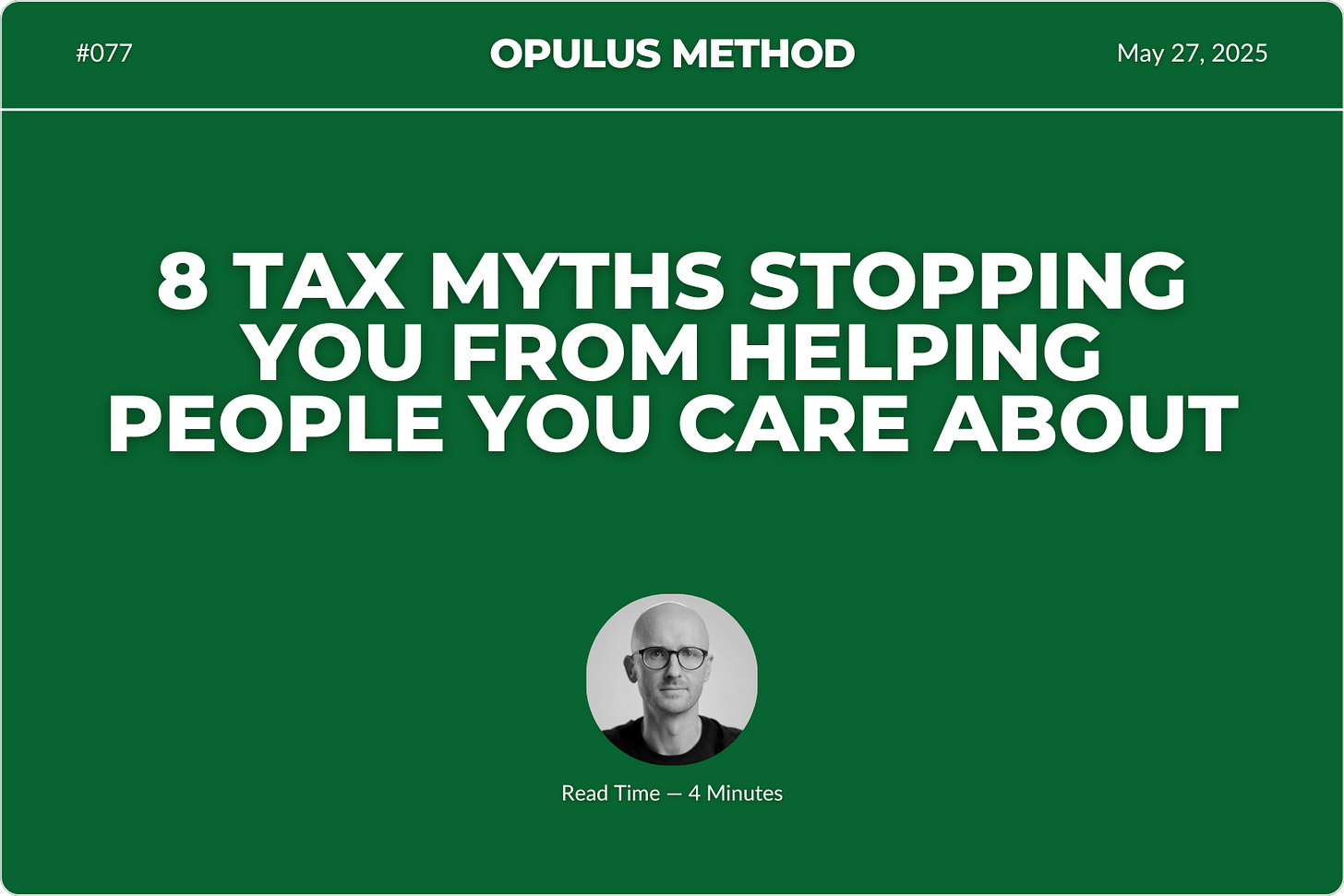8 Tax Myths Stopping You From Helping People You Care About
What my client did to help his son buy a house (with $0 in gift taxes)
The IRS wants you to give money away tax-free.
Yes, you read that correctly. The current system allows you to transfer up to $13.99 MILLION during your lifetime without owing a cent in taxes.
Yet most Americans avoid strategic gifting.
Why? They fear triggering phantom tax bills that don't actually exist.
Last month, a client called me in a panic. His son had found the perfect home but was caught in a bidding war. My client wanted to help with the down payment to strengthen his son's offer.
"But my friend warned me about gift taxes," he told me. "He said I shouldn't do it because I'd owe thousands to the IRS."
My client had been misled by one of the most expensive tax myths in America. After our call, he made the gift, filed a simple form, paid $0 in taxes, and his son secured the home he would have otherwise lost.
In this newsletter, you'll discover:
The truth about annual gift exclusions
Why exceeding limits rarely means paying taxes
How married couples can double their giving power
Why recipients never owe taxes on your gifts
Let's debunk these myths once and for all.
Myth #1: "Giving money means paying taxes"
The IRS gives you MASSIVE tax-free gifting power every single year.
Here's the reality: You can give up to $19,000 (2025) to as MANY people as you want each year. No taxes. No paperwork. No reporting required.
Your tax-free giving power grows over time. The annual exclusion rises with inflation — from $15,000 in 2021 to today's $19,000. (Note that future tax law changes could alter this trajectory.)
Think about what this means:
Give $19k to your son? Tax-free.
Another $19k to your daughter? Also tax-free.
$19k to each of your five grandkids? Completely tax-free.
Want to help ten different people with $19k each? That's $190,000 in a single year without triggering a single tax form.
This isn't some obscure loophole — it's built right into the tax code.
What this means for you: You have significant annual giving power without triggering a single tax consequence.
Myth #2: "Exceeding the annual limit triggers immediate taxes"
Going over the annual limit doesn't mean writing a check to the IRS.
When you give someone more than $19,000 in a year, you simply file Form 709 to track it against your LIFETIME exemption of $13.99 million.
No immediate tax bill. The IRS just wants to keep count.
This means you could give someone $100,000 tomorrow and likely not owe a penny in taxes. You'd just need to file a form acknowledging the gift.
Freedom comes from understanding the rules, not fearing them.
What this means for you: Larger gifts are still possible without immediate tax liability, giving you flexibility for significant wealth transfers.
Myth #3: "The gift tax hits regular people hard"
The gift tax system wasn't built for regular folks like you and me.
Unless you're planning to give away more than $13.99 MILLION during your lifetime, you'll likely never pay a cent in gift tax. This system was designed to prevent the ultra-wealthy from avoiding estate taxes.
Important timing alert: Congress will cut this $13.99 million exemption roughly in half after 2025 unless they pass new legislation. This creates a strategic window for larger gifts.
For perspective: That's enough to give $500k to each of your children and still have millions left in your lifetime exemption.
Most Americans will never come close to hitting this ceiling.
What this means for you: Gift tax is rarely a concern for most Americans, freeing you to focus on strategic giving rather than tax avoidance.
Myth #4: "Recipients need to report gifts on their taxes"
The person receiving your generosity owes NOTHING.
When someone gets a gift from you – whether it's $500 or $50,000 – they don't owe taxes on it. No reporting. No paperwork. Nothing.
Gifts are not considered income to the receiver, period.
This makes strategic gifting one of the cleanest transfers of wealth possible. Your gift = their tax-free windfall.
What this means for you: Your generosity creates a true tax-free windfall for recipients with zero administrative burden on them.
Myth #5: "Small gifts are taxed differently than large ones"
The gift tax system is refreshingly binary.
Under $19k annually per person: completely invisible to the IRS
Over $19k: requires a form and counts against lifetime amount
No complex calculations. No sliding scales. No gray areas to navigate.
Just a simple threshold that makes planning straightforward without complicated tax math.
What this means for you: You can make clear gifting decisions without worrying about complex tax calculations or sliding scales.
Myth #6: "Married couples can only give a single exclusion amount"
Marriage doubles your tax-free giving power.
Each spouse can give the full annual exclusion to the same person. That's $38,000 per recipient in 2025 with zero reporting required.
This means:
Help your child with a down payment? $38k tax-free.
Fund your grandchild's college account? $38k tax-free.
Support your parents' medical expenses? $38k tax-free.
And remember — that's per person, per year. The next year, you can do it all over again.
What this means for you: Double the giving power when married lets you accelerate wealth transfers to the people who matter most.
Myth #7: "Gift splitting requires complex paperwork"
Sharing your gift exclusion with your spouse is surprisingly simple.
Gift splitting (where one spouse gives but both count it as coming from them) just requires checking a box on Form 709 and getting your spouse's consent.
Not rocket science. Not even tax science. Just a checkbox.
Don't let perceived complexity stop you from maximizing your giving potential.
What this means for you: Simple paperwork shouldn't prevent you from maximizing all available tax benefits when giving.
Myth #8: "Once you file Form 709, you'll be audited"
Filing a gift tax return won't put a target on your back.
Form 709 is a routine document that millions file each year without issue. The IRS has bigger concerns than your generous gift to your nephew.
There's no special "gift tax audit team" waiting to pounce on your generosity.
File accurately, keep good records, and sleep soundly knowing you've done things by the book.
What this means for you: Don't let audit fears prevent proper reporting — the IRS has bigger concerns than your generous gifts.
That's it.
Strategic gifting is one of the most underutilized wealth-building tools available to regular families.
The system is actually designed to make it easy to transfer wealth — up to certain generous limits — without triggering taxes. When you understand the actual rules instead of the myths, you unlock significant planning opportunities.
Don't let unfounded tax fears keep you from helping the people you care about. Just like my client, who almost missed helping his son secure a home because of tax myths, you might be holding back unnecessarily.
The financial freedom you want for yourself can extend to those you love most, starting today.
The system is set up in your favor. It's time you used it.
Whenever you're ready, there are 2 other ways we can help you:
30-Day Strategy Sprint: Got a specific financial challenge holding you back? In just 30 days, we'll tackle 1-3 of your biggest money roadblocks and hand you a personalized action plan. Perfect if you want expert guidance without a long-term commitment. Limited spots available.
Ongoing Wealth Partnership: We'll work with you month after month to slash your taxes, find hidden income opportunities, and build lasting wealth. You set the life goals. We handle the financial strategy to get you there faster.
Opulus, LLC (“Opulus”) is a registered investment advisor in Pennsylvania and other jurisdictions where exempted. Registration as an investment advisor does not imply any specific level of skill or training.
The content of this newsletter is for informational purposes only and does not constitute financial, tax, legal, or accounting advice. It is not an offer or solicitation to buy or sell any securities or investments, nor does it endorse any specific company, security, or investment strategy. Readers should not rely on this content as the sole basis for any investment or financial decisions.
Past performance is not indicative of future results. Investing involves risks, including the potential loss of principal. There is no guarantee that any investment strategies discussed will result in profits or avoid losses.
All information is provided "as-is" without any warranties, express or implied. Opulus does not warrant the accuracy, completeness, or reliability of the information presented. Opinions expressed are those of the authors, Ryan Greiser and Francis Walsh, and are subject to change without notice.
Opulus is not responsible for any errors or omissions, nor for any direct, indirect, or consequential damages resulting from the use or reliance on this information. Use of the content is at your own risk. This content is not intended as an offer or solicitation in any jurisdiction where such an offer or solicitation would be illegal.





